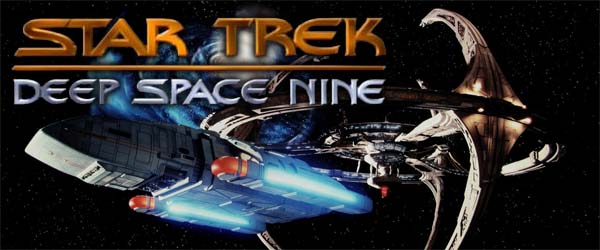
In the age of streaming and binge-watching here in the year 2023, long-form serialized television is now ubiquitous. Every network and streaming service has wanted its own blockbuster TV shows. Whether it's AMC's The Walking Dead and Breaking Bad, HBO's Game of Thrones, Sci-Fi's Battlestar Galactica, Netflix's House of Cards and Stranger Things, History's Vikings, and so forth, it seems that every big new show outside of sit-coms has a heavily-serialized format. Procedural dramas are going the way of the dinosaur.
Serialized, long-form television may be commonplace now, but back in the 1990's, it was virtually unheard of outside of daytime soap operas (such as Dallas and Dynasty) and the occasional network mini-series. At least, this was the case in the United States. British television has a much longer track record of serialized story-telling. A big part of why serialized television was uncommon was that the producer(s) of network syndicacted shows didn't have as much control over when its affiliates decided to air the shows, or how heavily they would market and advertise it. Furthermore, the networks or affiliates could change the time slot of the show pretty much at a whim. Viewership, therefore, would be much more fickle and fractured. Audiences would pop in and drop out. Expecting the audience to have seen every previous episode in preparation for this week's episode was a dangerous and risky expectation for a production studio. It's easy to lose viewers if none of them know what's going on.
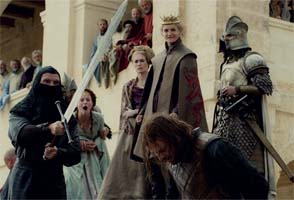 - Game Of Thrones, copyright HBO
- Game Of Thrones, copyright HBO
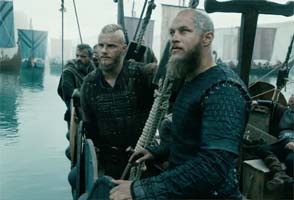 - Vikings, copyright History Channel
- Vikings, copyright History Channel
Highly serialized, long-form drama are the norm for modern networks and subscription television services.
As I mentioned in the previous essay, this was the case with me. I was in elementary school and middle school during DS9's run, and I missed a lot of episodes in the first couple seasons, despite wanting to watch the show. Missing so many episodes meant that I had very little idea what was going on when I would watch, and so I mostly lost interest in the show. If my dad was watching it, and I was there, I'd watch it, but I wasn't planning my day around it.
Looking back now, that sort of serialized story-telling is now ubiquitous and expected, and so it's easier to recognize that Deep Space Nine was truly innovative and ahead of its time in this regard.
Long-form story-telling
Serialized story-telling wasn't alien to Star Trek. Deep Space Nine premiered in 1993, the same year as the sixth season of Next Generation. By this time, The Next Generation had several story threads that had recurred over the course of a season, or over multiple seasons -- as well as several attempted overarching plot threads that were dropped.
As early as the first season of Next Generation, Q had become a recurring antagonist, and his "judgement" over the human race was established as a recurring plot thread. Heck Q's judgement of humanity was originally depicted as the framing mechanism for the entire show! It was scaled back in the following seasons due to the general poor reception of the first season, and the fact that John de Lancie just works better in a more whimsical and comic role.
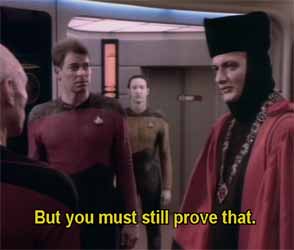 - TNG "Encounter At Farpoint", season 1, episode 1
- TNG "Encounter At Farpoint", season 1, episode 1
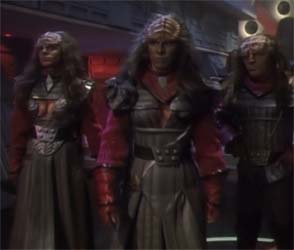 - TNG "Redemption, Part I", season 4, episode 26
- TNG "Redemption, Part I", season 4, episode 26
TNG had several recurring plot threads.
The final two episodes of Next Generation's first season, "Conspiracy" and "The Neutral Zone", seem to have been part of an abandoned attempt at more long-form story-telling. Both seem to be trying to establish some new threat to the Federation (and possibly a shared threat between the Federation and other rival powers such as the Romulans). I think the original idea was for this to become an overarching storyline for the entire series. But the thread from "Conspiracy" was completely dropped, and the destroyed colonies referenced in "The Neutral Zone" were re-written to be retroactive foreshadowing of the Borg's appearance in season 2.
[More]
cddb26c9-ca5a-4327-b199-d0d00dec522b|0|.0
Tags:Star Trek, Star Trek: Deep Space Nine, Federation, Starfleet, progressivism, humanism, secularism, religion, fundamentalism, fascism, terrorism, war, trans-gender, Worf, Odo, Quark, Moogie, Ishka, Bajor, Dominion, Founder, Changeling, Jem'Hadar, Cardassian, streaming television, Game of Thrones, Battlestar Galactica, the X-Files, Babylon 5, Buffy the Vampire Slayer, The Sopranos, Lost, Twin Peaks
George R.R. Martin has yet to finish writing the book series.
Let HBO's Game of Thrones series stand as a testament to why companies should not adapt works for television or movies until after that work is actually complete. Game of Thrones was a huge hit when it premiered, and its early seasons are among the best television in recent memory. However, the last two or three seasons have been ... less good. The writing has become more spotty, characters are behaving more impulsively, the pacing has been rushed, and the whole thing just seems to be less well thought-out.
This could be due, in large part, to the fact that after the fifth or sixth season of the show, showrunners David Benioff and D. B. Weiss have advanced beyond the source material. George R. R. Martin has yet to finish writing the final two books in the series -- a process which may still take years! HBO didn't want to wait, and they continued on with the show despite the lack of established source material from which to pull. They've done so with the consent and advice of Martin, who supposedly provided Benioff and Weiss with an overview of what he wanted to write in those final two books, but the end result has been sub-par.
I've written previously about the show's fifth season, which is the last season of the series that I would consider to be "good". That season was criticized for being "slow and boring" by some, and also for using shock value (such as the rape of Sansa by Ramsey Bolton) as a gimmick to keep people interested. However, I thought that the fifth season was tightly unified by its consistent themes of futility and self-destruction, as each of the major players slowly succumbed to their most fundamental impulses and took actions that ended up undercutting their own goals.
Season five had a consistent theme of self-destructive leaders.
Seasons seven and eight, however, have been much less defensible.
Season seven cut the episode count from the usual ten down to only seven, which resulted in the season as a whole feeling rushed and under-developed. Characters began to act more rashly, with little attention paid to building up to those actions. They travel great distances in what seems like no time at all. Plot threads would be left dangling, or would be set up and never paid off.
The Unsullied were left at Casterly Rock with no supplies,
only to show up a few episodes later no worse for wear.
For example, mid-way through the season, the Unsullied Army travels to Casterly Rock to fight the Lannister army, only to find that the Lannisters have abandoned the castle, destroyed the grain reserves, and salted the land. The episode makes a big deal of the fact that the Unsullied are now stuck there with no provisions and no hope of receiving reinforcements or supplies. Then we don't see or hear from them for, like, two episodes, before they suddenly show up again at Dragonstrone no worse for the wear.
Season eight seems to have doubled down on most of these problems. The season has been reduced further to only six episodes, and events are happening with even less build-up or set-up. Scenes are being added for shock value without any rhyme or reason. Characters are behaving out of character, or suddenly having changes of heart at the flip of a switch. Characters who used to be clever are acting like bafoons.
... [More]
54ba5529-dd1d-4888-9565-e0e4c0842572|1|4.0
Tags:Game of Thrones, HBO, Home Box Office, streaming television, George R. R. Martin, A Song of Ice and Fire, novel, Iron Throne, Cersei Lannister, Daenerys Targaryen, John Snow, Arya Stark, White Walkers, dragon, winter, King's Landing, Winterfell, Mary Sue
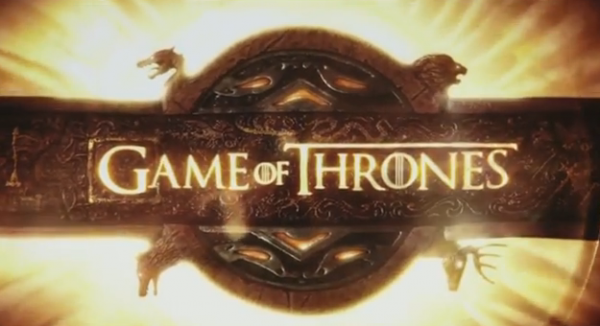
I recently wrote an analysis of Game Of Thrones' fifth season. I had originally planned to include some speculation about the sixth season, but it wasn't really relevant to the point of the article, which was to describe the themes present in the season. So for the sake of brevity, I moved that speculation to a new post.
What season five does very effectively is to blur the lines between heroes and villains and establish a series of new external threats to entrenched powers and factions. And the self-implosion of the Lannisters, Stannis, Boltons, and the crossing of the Wildlings leaves the Seven Kingdoms vulnerable to the internal strife that made the first few seasons so compelling. In addition, we may finally see a genuine power stuggle across the Narrow Sea.
The stage has been set for power stuggles to take place - not just in King's Landing - but throughout the entire world.
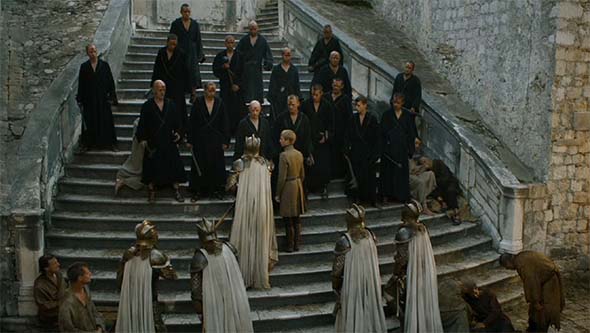
The Lannisters' authority in King's Landing is now being threatened by multiple sources,
including the High Sparrow's cult witch hunts [PICTURED] and the Tyrells and Littlefinger.
CAUTION: THIS POST CONTAINS MAJOR SPOILERS FOR THE FIFTH SEASON [More]
8d5b1285-fb27-4378-b7d3-776660597f94|1|3.0
Tags:Game of Thrones, HBO, Home Box Office, streaming television, Cersei Lannister, Daenerys Targaryen, Tyrion Lannister, John Snow, Jamie Lannister, Ellaria Sand, Ramsey Bolton, Margaery Tyrell, Little Finger, High Sparrow, White Walkers, The Mad King, Aerys II Targaryen
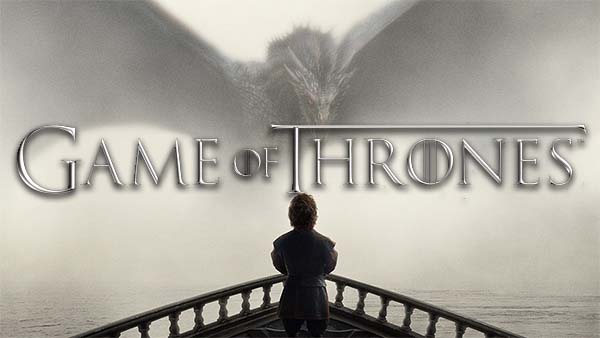
I've been seeing a lot of mixed reaction to the most recent season of HBO's Game Of Thrones (season five). Many sources on the internet have referred to it as the slowest and most boring season of the series so far. And episode six (Unbowed, Unbent, Unbroken) has been reviled as one of the worst episodes of the series due to the sexual assault of poor Sansa. Anecdotally, the people who I know who watch it (including my girlfriend, who got me into the show to begin with) have been disappointed by the apparent uneventfullness of this season. Another friend even said he was likely going to give up on the show completely because he's sick of the show dragging on and then suddenly doing things apparently only for shock value. I think his reaction is a bit extreme.
On the other hand, this season's eighth episode, Hardhome has been received as the best episode of the series so far.
But now that the season is over, and the shocks have been given, it puts the entirety of the season into perspective - at least for me.
The whole of Game of Thrones' fifth season has an over-arching theme of fatalism and futility. And the final episode shifted both of those themes to full-blown self-implosion. Every major character in every theater of operations made very self-destructive choices. And they all suffered for it, and those that survived will continue to suffer into season six. This season also may have shifted long-standing opinions on who are the favored characters and factions, which could be a deliberate attempt to ramp up the tension for a more conflict-filled sixth season.
Season five started with numerous characters and factions at the height of their power. Daenerys, Stannis, Ramsey, and John Snow all had enormous successes at the end of season four and start of season five. The Lannisters may have suffered a severe blow at the end of last season, but their grip on King's Landing was still firm at the start of season five. They all manage to blunder these successes into utter failures by the end of season five.
Probably the most immediately obvious case of self-destruction is Stannis. While most of the season looked as though he was putting himself in a position of strength and was primed to recapture Winterfell, he was also falling victim to the classic Napoleon / Hitler mistake: he tried to invade a tundra empire at the onset of winter. As successful as his actions were in the first half of the season, there was always a feeling of impending dread and desperation hanging over him and his army.
Even those of us who were won over by Stannis' actions at the wall, and his hearftful defense and expression of love for his deformed daughter, must've recognized that he seemed fated to fail.
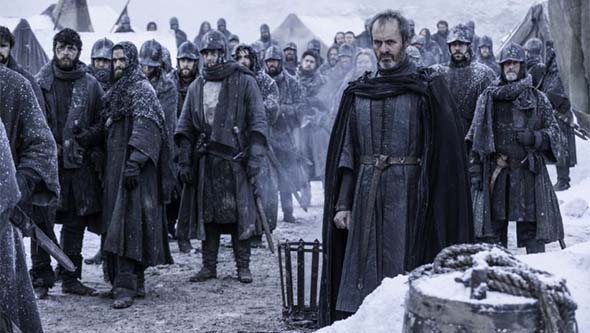
How could anyone follow a man who would do what Stannis has chosen to done?
Stannis cements his doom with quite possibly the worst, and most heartless decision that any character has made in the show to date...
CAUTION: MAJOR SPOILERS AHEAD [More]
9960e026-072e-41f5-a021-7a43834bdc0e|4|5.0
Tags:Game of Thrones, HBO, Home Box Office, streaming television, Iron Throne, Stannis Baratheon, Cersei Lannister, Daenerys Targaryen, John Snow, Arya Stark, Jamie Lannister, Ellaria Sand, Ramsey Bolton, Margaery Tyrell, High Sparrow, White Walkers
It was a couple years before I hopped onto the Game of Thrones bandwagon. My girlfriend insisted that I watch it, so I went through the entire backlog of seasons one through four over the fall and winter. So when I saw that there was a game available on Steam, I bought it for her. Unfortunately, she doesn't have the patience for this game's style of narrative gameplay, and she got bored with it and gave up within an hour. I had hoped that the excitement of new Game of Thrones content would offset the lack of interaction, but I was wrong. So I figured I'd play it in order to get my money's worth, since I'm more tolerant of "interactive movie" games, and I liked Telltale's previous Back to the Future game just fine.
Only the first two episodes (Iron From Ice and The Lost Lords) are currently available, and the remaining four episodes are expected to be released every couple months through the rest of the year.
Telltale is always absolutely dedicated to making their games look and sound like the source material,
right down to the show's stylish (and surprisingly informative) intro sequence for each episode.
As an "interactive movie", Telltale's Game of Thrones title is definitely worthwhile, as it's basically like watching episodes of the series. It adds to the narrative of the TV show by telling the tale of the Forrester house, who (following the events of the show's infamous "Red Wedding") find themselves suddenly under the dominion of the hated rival family, the Boltons. The game requires you to play as a small handful of family members (spread out between Forrester's own Ironrath keep, King's Landing, and the Black Fort) as they seek political alliances in order to protect the Forrester house from the Boltons' tyranny.
Or at least, that's the set-up. In true Game of Thrones nature, it doesn't take long for shit to hit the fan, and for all your expectations to fall apart.
The game has very little "action", as most of the focus is on conversation and plotting between characters. So if you're expecting a hack-n-slash game in the style of Skyrim, then you'll have to look elsewhere. Maybe that hack-n-slash game from Focus Interactive is what I should have bought for my girlfriend. Or maybe not...
Even the more intense action segments of the game (such as battles or brawls) require very little interaction or decision-making from the player. Most of the time, it's just an elaborate quick-time event, requiring you to complete the scene by just following on-screen prompts.
Once you get comfortable with the commands, action sequences require virtually no thought or skill from the player.
The action sequences were quite challenging at first, because they required the use of mouse commands and the arrow keys and other keyboard commands. And I only have two hands. Alternating between the mouse and arrow keys on the keyboard was a challenge, until I realized that the W,A,S, and D keys can be substituted for the arrow keys. Then the action sequences became trivially easy.
These sequences were extremely disappointing because of the lack of active participation from the player. The open exploration and puzzle-solving from Back to the Future is almost completely gone ...
[More]
02eaa331-cc12-4747-9648-d0f27ec3f8fa|0|.0
Tags:Game of Thrones, Iron From Ice, The Lost Lords, HBO, Steam, PSN, XBox Live, point and click, politics, episodic, Forrester, Stark, Lannister, Bolton, ironwood, Telltale Games
|

| 12 | | | | | | | 60 | | 11 | | | | | | | 55 | | 10 | | | | | | | 50 | | 09 | | | | | | | 45 | | 08 | | | | | | | 40 | | 07 | | | | | | | 35 | | 06 | | | | | | | 30 | | 05 | | | | | | | 25 | | 04 | | | | | | | 20 | | 03 | | | | | | | 15 | | 02 | | | | | | | 10 | | 01 | | | | | | | 05 |
|